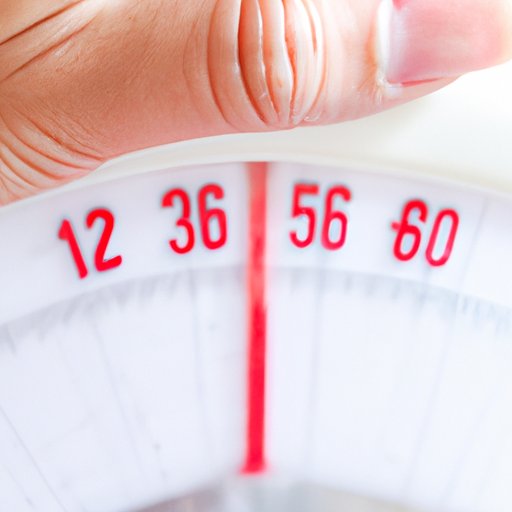
Introduction
Water weight is a term that is often used in the weight loss industry. It refers to the water that is retained by the body and the resulting increase in weight. Understanding water weight is important for individuals who are trying to lose weight, maintain a healthy weight, or improve their overall health. In this article, we will explore the concept of water weight, its impact on the body, and provide tips on how to reduce it naturally.
Explaining the Concept of Water Weight and Its Impact on the Body
Water weight, also known as edema, is the excess water that is stored in the body’s tissues. It can result in temporary weight gain and bloating. This excess water can be found in the feet, ankles, legs, and hands and can cause discomfort, inflammation, and a decrease in mobility.
Water weight is often confused with fat weight. The key difference between the two is that water weight is temporary and can be reduced through diet and lifestyle changes whereas fat weight is a result of excess calories consumption and requires a caloric deficit to be reduced.
Discussing the Causes of Water Weight Gain and the Factors That Contribute to It
There are several factors that can contribute to water weight gain, including high sodium intake, hormonal changes during menstrual cycles or menopause, medication side effects, and medical conditions such as kidney, liver or heart diseases.
High sodium intake is the most common cause of water retention. When the body consumes excess sodium, it begins to retain more water to balance the electrolyte and sodium levels in the body. Hormonal changes during menstrual cycles, pregnancy, or menopause can also cause water weight gain. Medications such as blood pressure medications, nonsteroidal anti-inflammatory drugs (NSAIDs), and steroid drugs can also cause water retention.
Providing Tips on How to Reduce Water Weight Naturally through Diet and Lifestyle Changes
If you are looking to reduce water weight, there are several steps you can take to achieve this. One of the most effective ways is to reduce your sodium intake. Most of the sodium in our diets comes from processed foods, so by switching to whole foods, you can easily reduce your sodium intake. Additionally, increase your water consumption as this can help the body flush out excess water and maintain proper hydration.
Exercise is also an effective way to reduce water weight as it helps increase the body’s circulation, improve lymphatic drainage, and reduce inflammation. Moreover, maintaining a well-balanced, healthy diet is crucial for overall weight management and long-term health benefits. A diet with a variety of fruits, vegetables, lean protein, whole grains, and healthy fats can aid in reducing water weight and promote a healthy weight balance.

Differentiating Between Water Weight and Fat and the Importance of Understanding the Difference
It is crucial to differentiate between water weight and fat weight, especially when trying to lose weight. Unlike water weight, fat weight is a result of consuming more calories than the body requires. Reducing fat weight requires a state of caloric deficit where the body burns more calories than it consumes. Understanding the difference between the two can help individuals set realistic weight loss goals and avoid unhealthy, fad diets.
One way to differentiate between water weight and fat is through touch and analysis of physical features. Water weight tends to increase the physical size of the body, resulting in bloating, puffiness, and edema. In contrast, fat weight adds flabbiness, and sagging skin to the body’s physical appearance. A bodyfat measurement using calipers or a bodyfat percent scale can also help differentiate between the two.
Discussing the Common Misconceptions Surrounding Water Weight and Clarifying the Truth
There are several common misconceptions surrounding water weight. The most popular is that drinking more water leads to water weight gain. While it is true that drinking more water can cause temporary water weight gain, it can also reduce water weight by increasing urine productions and decreasing salt accumulation in the body. Another common myth is that the ketogenic diet causes water weight gain. As with any dietary change, sudden ketosis can lead to an increased water weight gain due to increased sodium intake. However, as individuals adapt to the diet, water weight returns to normal levels.
Addressing the Importance of Treating Underlying Conditions That Can Cause Water Weight Gain
In some cases, water weight gain can be caused by underlying medical conditions such as kidney, liver, or heart diseases. It is important to seek medical care to diagnose and treat the underlying cause of water weight gain. Additionally, medications that cause water weight gain should be reviewed with medical providers to determine if alternative medications are available.
Conclusion
It is important to understand the concept of water weight and its impact on the body for individuals who are looking to lose weight, maintain a healthy weight, or improve their overall health. Through proper diet, lifestyle, and medical care, water weight gain can be minimized, and individuals can see improved health outcomes. Understanding the difference between water weight and fat weight is crucial for setting realistic health goals.





